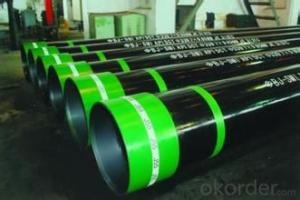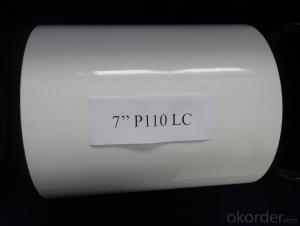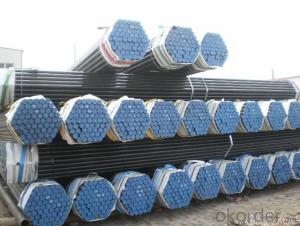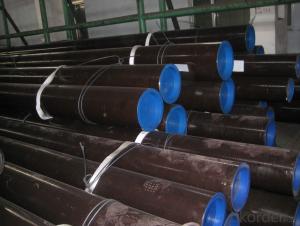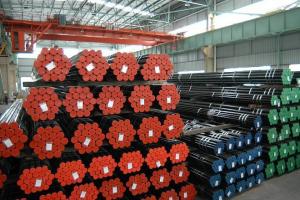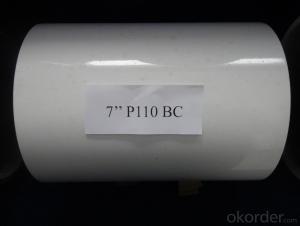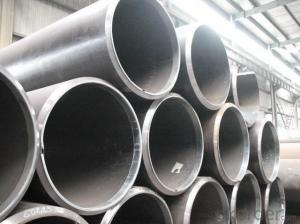9 5/8" 36ppf API 5CT seamless Casing pipe
- Loading Port:
- Shanghai
- Payment Terms:
- TT OR LC
- Min Order Qty:
- 10 m.t.
- Supply Capability:
- 100000 m.t./month
OKorder Service Pledge
Quality Product, Order Online Tracking, Timely Delivery
OKorder Financial Service
Credit Rating, Credit Services, Credit Purchasing
You Might Also Like
API 5CT Tubing & Casing nd Coupling
Size: OD 2 3/8"~ 4 1/2",4 1/2"~20"
Grade: H40,J55,K55,N80,C90,T95,P110
Length:R1,R2,R3
API 5CT Tubing & Casing nd Coupling
1. Size: OD 2 3/8"~ 4 1/2",4 1/2"~20"
2. Grade: H40,J55,K55,N80,C90,T95,P110
3. Length:R1,R2,R3
4. Stabdard: API SPEC 5CT
5. Application: Tubing is used to extracting petroleum and natural gas from a well.
6. Packing: bundle or loose
- Q: Can steel pipes be threaded?
- Yes, steel pipes can be threaded. Threading is a common process used to create screw-like ridges on the ends of the steel pipes, allowing them to be easily connected to fittings or other pipes.
- Q: How much is the tube?
- The theoretical weight calculation formula of ordinary carbon steel tube is:The weight of each meter is kg/m= (outer diameter mm-, wall thickness mm) * wall thickness mm*0.02466For example: inventory 20# pipe diameter of 108*4.5 weight per meter:Kg/m= (108-4.5) *4.5*0.02466=11.485In accordance with the diameter of 108*4.5 steel pipe market price is 4500 yuan / ton as an example, we can know the diameter of 108*4.5 steel pipe per meter price: 11.485*4.5=51.68 yuan.
- Q: How are steel pipes used in the defense sector?
- Steel pipes are used in the defense sector for various purposes such as constructing military infrastructure, including bunkers, underground facilities, and missile silos. They are also utilized in the manufacturing of military vehicles, weapons systems, and equipment. Steel pipes provide strength, durability, and resistance to extreme conditions, making them ideal for applications in the defense sector.
- Q: What are the common problems or issues faced with steel pipes?
- Common problems or issues faced with steel pipes include corrosion, rusting, leaks, cracks, and blockages. Corrosion can occur due to exposure to moisture or chemicals, leading to a decrease in pipe integrity and potential leaks. Rusting is another common problem, especially in outdoor or wet environments, which can weaken the pipe and cause structural issues. Leaks can result from pipe corrosion or cracks, leading to water damage and potential pipe failure. Blockages can occur due to debris, scale buildup, or pipe collapse, restricting the flow of fluid or causing complete pipe blockage. Regular maintenance and inspections are necessary to identify and address these issues promptly.
- Q: What are the different methods of cleaning steel pipes?
- There are several methods of cleaning steel pipes, including mechanical cleaning, chemical cleaning, and high-pressure water jetting. Mechanical cleaning involves using wire brushes, scrapers, or sandpaper to physically remove debris and rust from the pipe's surface. Chemical cleaning involves using solvents or acids to dissolve contaminants and rust, followed by flushing the pipe with water. High-pressure water jetting uses a stream of water at high pressure to remove dirt, rust, and other deposits from the pipe's interior and exterior surfaces.
- Q: What are the common factors affecting the flow capacity of steel pipes?
- The flow capacity of steel pipes can be affected by several common factors. Firstly, the diameter of the pipe plays a crucial role. A larger diameter allows for a greater flow capacity because there is more area for the fluid to pass through. Secondly, the length of the pipe also affects flow capacity. Longer pipes tend to have higher frictional losses, which can decrease the flow capacity. Thirdly, the internal surface roughness of the steel pipe can impact flow capacity. Rough surfaces create more friction, resulting in a lower flow rate. Conversely, smooth pipes allow for smoother flow and higher flow capacity. The properties of the fluid being transported through the steel pipe are another important consideration. Factors such as viscosity, temperature, and density can all influence the flow rate. For example, highly viscous fluids have a lower flow capacity compared to less viscous fluids. Additionally, pressure drop along the length of the pipe is a significant factor. Friction, bends, and restrictions can all cause pressure losses, resulting in a lower flow capacity. The material of the steel pipe and its wall thickness also play a role. Different materials have varying properties that can impact flow rates. Moreover, thicker walls can reduce the internal diameter of the pipe, leading to a lower flow capacity. Lastly, the design and layout of the pipe system, including the presence of fittings, can impact flow capacity. Fittings such as valves, elbows, and tees can cause additional pressure drops and turbulence, reducing the overall flow rate. Considering these factors is essential when designing or evaluating a steel pipe system to ensure optimal flow capacity and efficiency.
- Q: Can steel pipes be used for wastewater treatment?
- Yes, steel pipes can be used for wastewater treatment. Steel pipes are commonly used in the construction of wastewater treatment plants and systems due to their durability, strength, and resistance to corrosion. They are especially suitable for transporting and distributing wastewater, as they can withstand high pressure and temperature variations. Steel pipes can also be coated or lined with materials that provide additional protection against corrosion and chemical reactions with the wastewater. However, it is important to ensure that the steel pipes are properly maintained, inspected, and replaced when necessary to prevent any potential leaks or failures that could compromise the wastewater treatment process.
- Q: What does the diameter of a steel pipe project mean?
- Nominal surface meaning can be understood as a public address. It's as if everyone agreed to call something as a "devil", and he was the devil.Don't be confused by the numbers behind the nominal diameter. For example, DN50, this 50 is really close to the outer diameter or inside diameter of the steel tube, but DN50 is only a general model of the caliber of the national standard.
- Q: Are steel pipes resistant to impact?
- Yes, steel pipes are generally resistant to impact due to their strong and durable nature. They can withstand heavy loads and external forces, making them suitable for applications that involve high-pressure environments or potential impact scenarios.
- Q: How are steel pipes used in the manufacturing of fire sprinkler systems?
- Steel pipes are commonly used in the manufacturing of fire sprinkler systems due to their durability and resistance to high temperatures. These pipes are used to transport water or other fire suppressants from the water supply to the sprinkler heads. The steel pipes are able to withstand the pressure and heat generated during a fire, ensuring a reliable and effective fire suppression system.
Send your message to us
9 5/8" 36ppf API 5CT seamless Casing pipe
- Loading Port:
- Shanghai
- Payment Terms:
- TT OR LC
- Min Order Qty:
- 10 m.t.
- Supply Capability:
- 100000 m.t./month
OKorder Service Pledge
Quality Product, Order Online Tracking, Timely Delivery
OKorder Financial Service
Credit Rating, Credit Services, Credit Purchasing
Similar products
Hot products
Hot Searches
Related keywords
